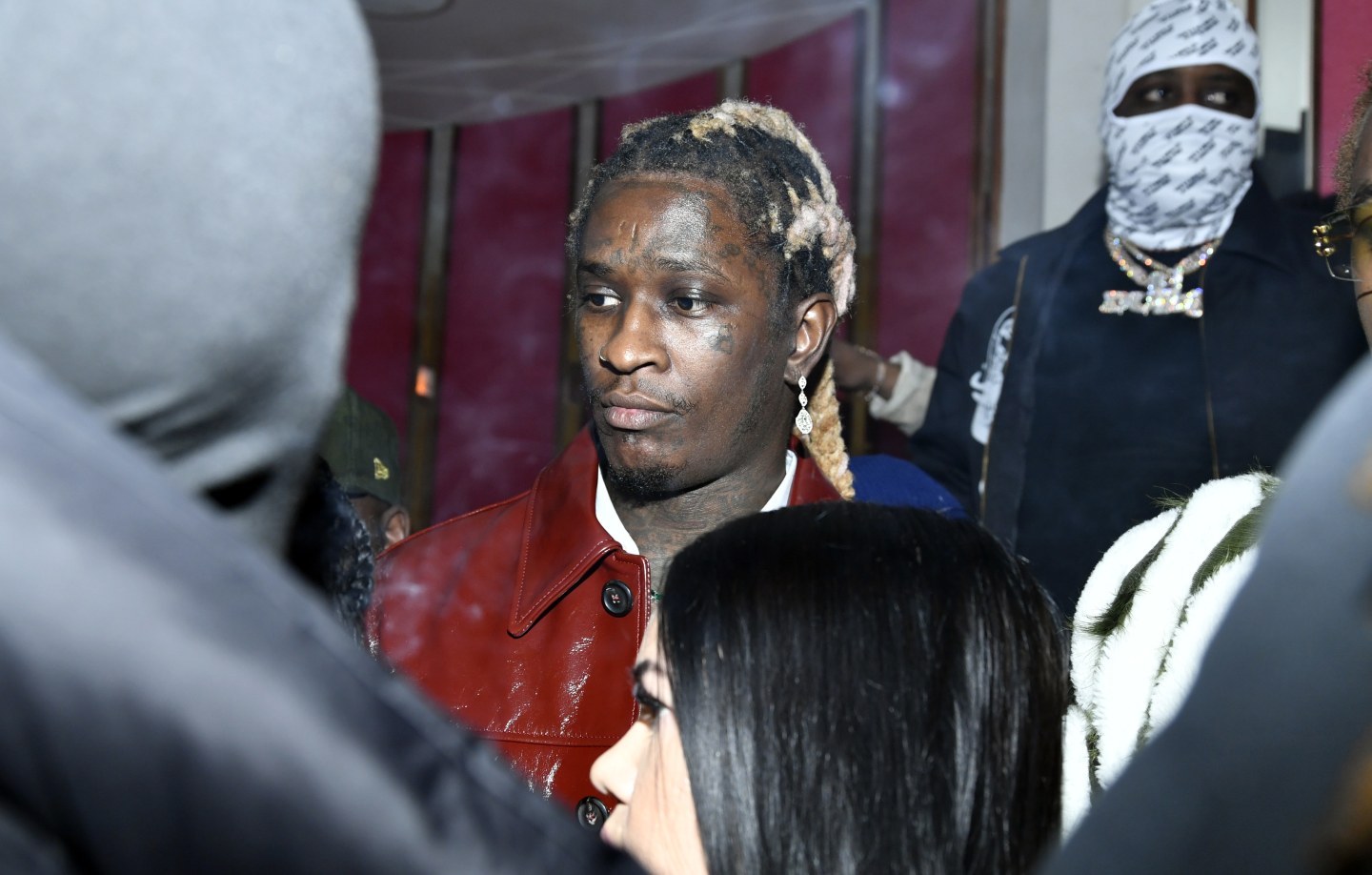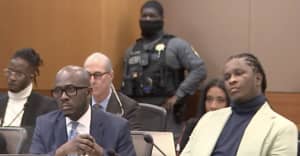Young Thug. Photo by Michael Tullberg/Getty Images.
Prior to this week, it had been a relatively sleepy few months for the RICO trial of Young Thug and YSL. The Atlanta rapper has sat in a Fulton County jail since May 2022, alleged by the state of Georgia to be the ringleader of a criminal street gang (six additional felonies connected to gang, drug, and firearm violations were added in August 2022). The case has dragged on since then — jury selection alone took 10 months — ensuring that only the most loyal Thug fans would watch the internet for updates, following court reporters assigned to the case and monitoring the video livestream, broadcast from inside the court.
Then, on Monday, everything exploded. Brian Steel, Young Thug’s lead attorney, accused Judge Ural Glanville of holding a secret meeting with the prosecution and a witness named Kenneth Copeland without notifying the defense — in almost all cases, Georgia law prohibits this kind of “ex parte” meetings from taking place. Steel said a source had told him that in the meeting, Copeland agreed to take the stand after the prosecution suggested that he could remain in jail until all the cases of all 26 defendants in the RICO trial are completed. This would constitute “coercion, witness intimidation, [and] ex parte communications,” Steel said as he requested a mistrial.
YOUNG THUG’S LAWYER HAS EVIDENCE OF COERSION AND WITNESS INTIMIDATION BY THE JUDGE AND THE STATE
THE JUDGE WANTS TO KNOW HOW HE FOUND OUT BUT STEEL ISN’T RATTING. THE JUDGE THREATENS STEEL WITH JAIL.
WOODY ALSO APPARENTLY ADMITTED HE’S THE ONE WHO KILLED NUT
CORRUPTION. pic.twitter.com/faGHjcQL21
— THUGGERDAILY ひ (@ThuggerDaily) June 10, 2024
The accusations seem even more serious in light of Judge Glanville’s response. Rather than deny them, the Judge repeatedly asked Steel to reveal his source. “You got some information you shouldn’t have gotten,” Glanville said, more outwardly concerned with how the information had been concerned than its content, a position that many observers thought lent credence to the allegations. After Steel’s steadfast refusals, Judge Glanville placed him in contempt and ordered a bailiff to remove him from the courtroom. By the end of the day, Steel was allowed to return but ordered to spend 20 days in jail over 10 weekends; Steel requested that he be allowed to serve his sentence in the same jail as Thug, to which Glanville agreed. (Steel’s firm declined to comment when reached by The FADER.)
Shock reverberated online from stan accounts like @ThuggerDaily (who launched the hashtag #FREESTEELE [sic]) to members of the Georgia legal community. Tweets from Andrew Fleischman, a Georgia criminal defense attorney and partner at Sessions & Fleischman, captured the tenor of most of the responses I saw: the ex parte meeting was extremely unusual and likely against the law, the contempt order had a good chance of being overturned, and the defense now has a great shot at overturning any conviction on the grounds of reversible error.
The following day, Fleischman wasn’t any less shocked by what he had seen. “It’s really unprecedented,” he told me over the phone from Atlanta. He added that the legal community was all on the same page in their disapproval (this was reinforced when around two dozen attorneys posted up outside the courtroom after Glanville’s contempt order). “I think pretty much everybody agrees it was crazy,” Fleischman told me. “There’s nobody out there saying ‘What this judge was doing was perfectly normal. Why make a big deal out of it?’”
So will Judge Glanville stay on the case? “I would expect that you’ll have a recusal motion probably coming down the pipe today,” Fleischman told me. However, it’s initially up to Judge Glanville to decide on the motion. “They’re going to ask the judge to step aside and let another judge rule on it. Hopefully he does that. I think the rules require it.” However, recusal motions can take a really long time: “Like a year,” Fleischman says, emphasizing that “nothing happens fast” in Georgia courts.
If Glanville refuses to recuse himself, the defense will have to wait until the trial ends and launch an appeal. Glanville could be leaning against it at the moment, as he repeatedly stressed during the blow-up on June 10 that a Georgia appeals court could determine whether or not he did something improper. And while that may appear to a layperson (like myself) to be an egregious and clear-cut denial of due process, Fleischman says it’s something he hears all the time. “It’s to say that this is my best decision, and if you disagree, you can take it up with the court. [It’s] a way of cutting off debate. I wouldn’t read into it more than that. I don’t love when judges say it, but they do say it a lot.”
As for this development’s consequences on the future of the prosecution, there is now a slim chance for the entire case to be dismissed. “I think it’s possible that if a recusal passes and a mistrial happens,” Fleischman explains, “they might say double jeopardy law is implied. For reasons that are complicated and hard to explain, if the state tries to get a mistrial, if they mess up in that way, then you can sometimes force them to not be allowed to retry the case, because you’re saying, ‘Hey, you were deliberately messing up my trial, and that means you don’t get another shot at it.” Proving that the state botched the trial on purpose might be difficult. But, as we’ve seen over the past 48 hours, anything can happen (and sometimes, actually does).





